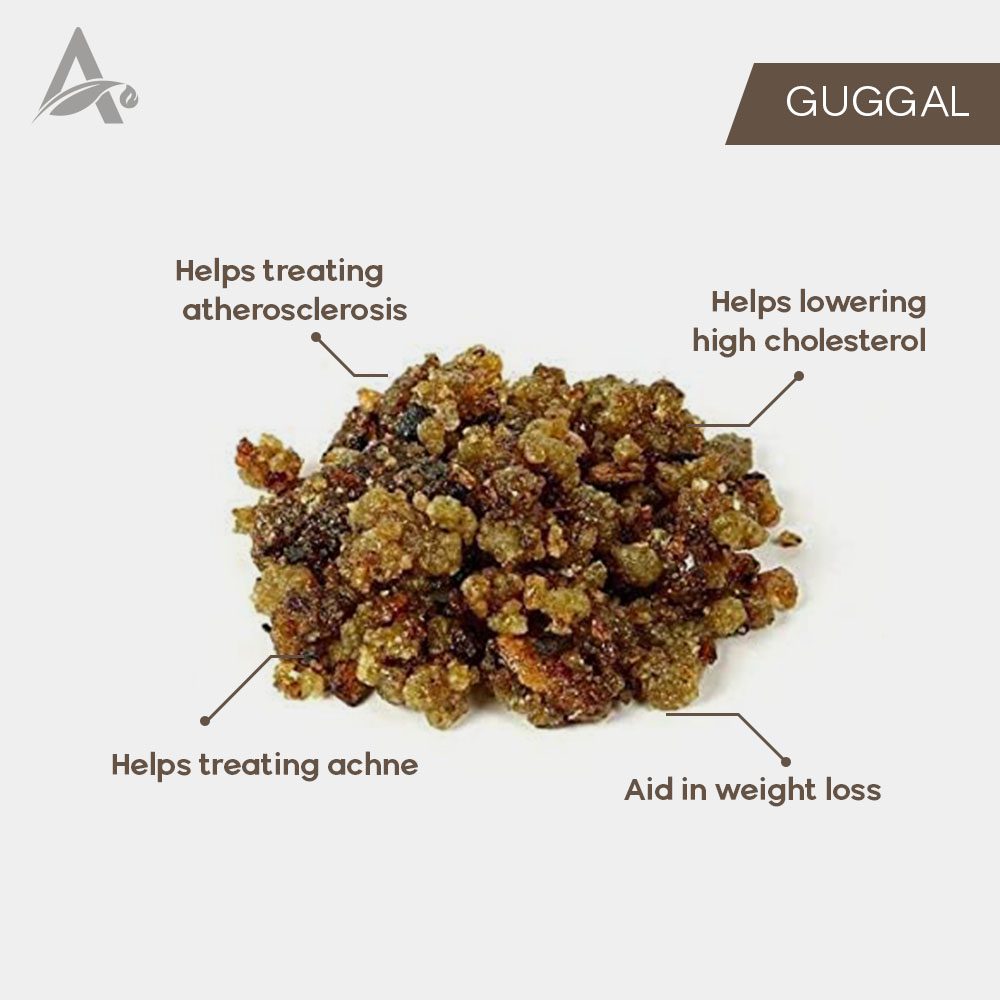Introduction

Guggul, also known as Gugal, is a resin extracted from the Commiphora wightii plant, which belongs to the family Burseraceae. This natural substance has been used for centuries in Ayurvedic medicine, primarily for its therapeutic properties. The resin, known for its potent bioactive compounds, is sought after for its potential in treating a variety of health issues, including inflammation, cholesterol levels, and weight management. In this article, we’ll explore the forms of Guggul, its health benefits, and potential side effects.
Forms of Guggul
Guggul is available in a variety of forms, making it accessible for different medicinal uses. These include:
- Guggul Resin: The raw form of Guggul, often in a sticky or powdery state, is used directly in Ayurvedic preparations.
- Capsules and Tablets: Guggul is available as standardized herbal supplements, often in the form of capsules or tablets, providing a more convenient dosage.
- Guggul Oil: Extracted from the resin, Guggul oil is used in traditional healing practices, particularly in Ayurvedic topical treatments.
- Powdered Form: Guggul can be ground into a fine powder and is typically mixed with other herbs or ingredients to create holistic remedies.
- Tinctures: Guggul is also available in liquid form as a tincture, which is often taken by dropper for specific health concerns.
Health Benefits of Guggul
Guggul has a wide range of therapeutic benefits, many of which are backed by both traditional wisdom and modern scientific research. Some of the primary benefits include:
1. Cholesterol Management

Guggul has been widely studied for its potential to reduce high cholesterol levels. Research has shown that Guggul extracts may help lower LDL (bad) cholesterol and triglycerides while increasing HDL (good) cholesterol levels. This makes Guggul an effective herb for maintaining cardiovascular health and supporting overall lipid metabolism.
2. Anti-inflammatory Properties
Guggul contains compounds such as guggulsterones, which have anti-inflammatory properties. It is commonly used in Ayurvedic medicine to treat inflammatory conditions such as arthritis, gout, and other joint-related disorders. By reducing inflammation, Guggul helps alleviate pain and discomfort in affected areas.
3. Weight Loss and Metabolism
Guggul is believed to promote weight loss by stimulating the thyroid gland, which helps regulate metabolism. Some studies suggest that Guggul may enhance the body’s ability to burn fat, making it a popular choice in weight loss supplements. It is often included in formulations designed to support metabolic health and reduce body fat.
4. Skin Health
The antioxidant properties of Guggul help in reducing oxidative stress in the body, which can improve the appearance of the skin. Guggul is often included in Ayurvedic skincare products due to its ability to treat acne, eczema, and psoriasis. Topical Guggul oil is used to promote healing and maintain healthy, glowing skin.
5. Joint Health
As a traditional treatment for joint pain, Guggul is often used in Ayurvedic formulations aimed at improving mobility and relieving discomfort associated with conditions like osteoarthritis. It works by reducing inflammation and promoting overall joint health.
6. Detoxification
In Ayurvedic medicine, Guggul is believed to have detoxifying effects, helping to cleanse the body of toxins. It is commonly used in detoxification programs to enhance the body’s natural elimination processes and support liver function.
Side Effects of Guggul
While Guggul is widely regarded as safe for most people, it can cause side effects in certain individuals. Common side effects include:

1. Gastrointestinal Issues
Some individuals may experience digestive disturbances, including nausea, diarrhea, and bloating, when taking Guggul in higher doses. It is recommended to start with a low dose and gradually increase if necessary.
2. Allergic Reactions
Allergic reactions to Guggul are rare but can occur. Symptoms may include skin rash, itching, and swelling, particularly if you are allergic to other members of the Commiphora plant family. Individuals with allergies should consult with a healthcare provider before using Guggul.
3. Thyroid Issues
Guggul has been shown to influence thyroid function, which could be a concern for individuals with thyroid disorders. It may stimulate the thyroid, leading to increased metabolism, but for people with hyperthyroidism or hypothyroidism, it could exacerbate the condition.
4. Interactions with Medications
Guggul can interact with certain medications, including those used to treat cholesterol levels, blood sugar, and thyroid disorders. It is essential to consult with a healthcare professional before incorporating Guggul into your health regimen, especially if you are on prescription medications.
5. Pregnancy and Breastfeeding
As with many herbal supplements, Guggul should be avoided during pregnancy and breastfeeding, unless otherwise directed by a healthcare provider. Some compounds in Guggul may have uterine stimulant effects, which could pose a risk to pregnant women.
This Article is for Basic Information. Contact a professional doctor before using it.
HAKEEM KARAMAT ULLAH
+923090560000




